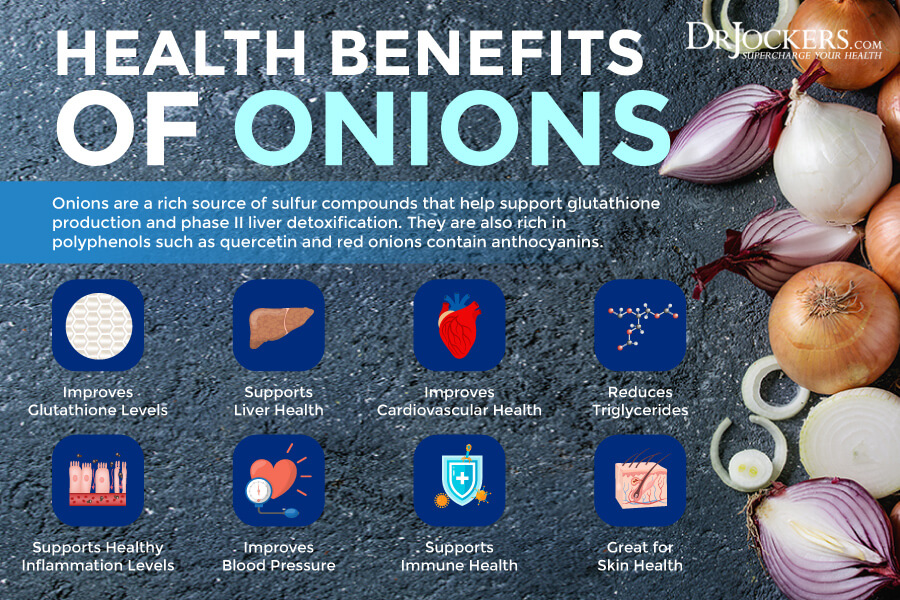Health Benefits of Onion, Uses And Its Side Effects
12. Easy to add to your diet
Onions are a staple in kitchens around the world.
They give flavor to savory dishes and can be enjoyed either raw or cooked.
Not to mention, they can boost your intake of fiber, vitamins, and minefrals.
Here are some tips on how to add onions to your diet:
- Use raw onions to add a kick of flavor to your guacamole recipe.
- Add caramelized onions to savory baked goods.
- Combine cooked onions with other vegetables for a healthy side dish.
- Try adding cooked onions to egg dishes, such as omelets, frittatas, or quiches.
- Top meat, chicken, or tofu with sautéed onions.
- Add thinly sliced red onions to your favorite salad.
- Make a fiber-rich salad with chickpeas, chopped onions, and red peppers.
- Use onion and garlic as a base for stocks and soups.
- Throw onions into stir-fry dishes.
- Top tacos, fajitas, and other Mexican dishes with chopped raw onions.
- Make a homemade salsa with onions, tomatoes, and fresh cilantro.
- Prepare a hearty onion and vegetable soup.
- Add onions to chili recipes for a flavor boost.
- Blend raw onions with fresh herbs, vinegar, and olive oil for a tasty homemade salad dressing.
SUMMARY
Onions can easily be added to savory dishes, including eggs, guacamole, meat dishes, soups, and baked goods.
The bottom line
The health benefits related to onions are quite impressive.
These nutrient-packed vegetables contain powerful compounds that may decrease your risk of heart disease and certain cancers.
Onions have antibacterial properties and promote digestive health, which may improve immune function.
What’s more, they’re versatile and can be used to heighten the flavor of any savory dish.
Adding more onions to your diet is an easy way to benefit your overall health.
Health Benefits of Onion, Uses And Its Side Effects
Onion is one of the common vegetables used in hundreds of dishes all over the world to enhance the taste. Eating raw onion daily offers lots of health benefits. Vitamin C and other nutrients in onion help to check cancer and also enhance skin and hair. The blood sugar levels are largely controlled by onion extracts and it also boosts immunity, sex drive and anemia control.
Onion
Onions are vegetables, which have the scientific classification of Allium cepa. They are rich in antioxidant compounds that are very effective in neutralizing the free radicals present in the human body. They have been used for decades by human beings for medicinal purposes.
Nutritional Value of Onion
Onions have many valuable medicinal applications because it acts as a rich source of nutrients, vitamins, minerals, and organic compounds. These include the presence of sulfuric compounds and quercetin which are essential for health.
Onion also contain mineral components such as calcium, magnesium, sodium, potassium, selenium, and phosphorus and they are a good source of vitamin C, vitamin B6, and dietary fiber.
Nutritional facts Per 100 Grams
Vitamins and Minerals
Health Benefits of Onion
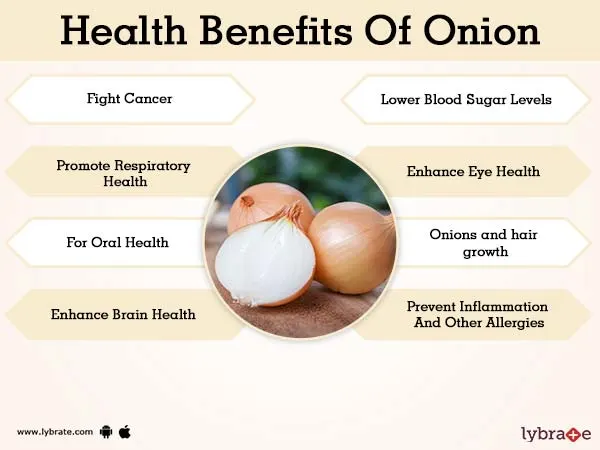
After getting onion nutrition facts, let check amazing Health Benefits of eating onions, you can onion in a different way, you can use raw onion in cooking for hundreds of dishes. Onion juice is also used for hair growth and skin care. According to the season, you find various onions such as red onion, green onion, white onion, etc. Onion offers medicinal properties and is used to treat mouth sores, headaches, and heart problems.
Onion Fight Against Cancer
Red onions are the most effective in destroying breast and colon cancer cells. Onions have a powerful compound called quercetin that plays a significant role in preventing cancer.
Onion Lower Blood Sugar Levels
One of the sulfur compounds present in onions (S-methylcysteine) and quercetin can have beneficial effects on controlling the blood sugar level in the body. Chromium, also present in this root vegetable, may help regulate blood sugar.
Onion Prevent Inflammation And Other Allergies
Quercetin (and other flavonoids) in onions helps in preventing inflammation. Onion also helps the treatment of allergies by preventing the cells from releasing histamine.Antihistamine properties of quercetin can also aid in reducing nasal congestion. The antibiotic effects of onion accelerate wound healing.
Onion Promote Respiratory Health
Patients with respiratory issues like asthma and allergic rhinitis can benefit from onion extracts. The prebiotics present in onion can help removing nasal congesion and thus aiding peaceful sleep.
Onion Juice Benefits for Eyes Health
The sulfur in onions improves the health of the lens of the eye thus aiding in vision. It stimulates the greater production of a protein named glutathione, which acts as an antioxidant and reduces risk of glaucoma, macular degeneration, and cataracts.
The selenium in onions supports the vitamin E in the eye (which protects the cells in the eye).Onion extracts can also aid in preventing the development of corneal haze and onion juice can also be used as eye-drops.
Onion Good for Oral Thrush
Onions contain a rich source of thiosulfinates and thiosulfonates (the sulfur compounds) that help scale down bacteria that cause tooth decay.The vegetable is also enriched in vitamin C that keeps the teeth healthy.Onions can relieve tooth pain.
Onion Juice for Hair Fall & Hair Regrowth
Rich in antibacterial and antifungal properties, onions help to nurture hair and proliferates its growth. The rich sulfur content and antioxidants prevent thinning and breakage and premature greying. They fight dandruff and assist in blood circulation that helps in hair growth.
Onion Benefits for Brain Health
Antioxidant rich onions bind with the harmful toxins in the brain and flush them out of the body.The extracts of onions have been found to maintain the hippocampus.
Another sulfur-compound in onions, named di-n-propyl trisulfide, improves memory impairment and lower down age-related memory loss. Onions are also believed to treat dizziness, epilepsy, and vertigo.
10 Benefits of Red Onions and How To Use Them
10 Benefits of Red Onions and How to Use
Onions are one of the most popular vegetables worldwide. While most children dislike their pungent and bity flavor, most adults embrace and use them regularly. Red onions contain twice as many antioxidants as any other form of onion making them a powerful part of an anti-inflammatory diet and lifestyle. This article will go over 10 benefits of red onions and how to use them to get the best results.
Red onions get their bite from the many sulfur groups they contain. These sulfur groups include the diallyl sulfides: DMS, DDS, DTS & DTTS. These sulfur groups help produce cysteine within the body that aids in weight loss, detoxification and cancer prevention (1, 2). Additional research has shown that sulfur compounds have a strong antioxidant capacity that inhibits blood cell clumping (3).
The sulfur compounds in red onions also lower LDL cholesterol & triglycerides while boosting HDL levels (4). They are associated with improving cell membrane function in red blood cells and improving oxygen utilization. This improves cardiovascular function as well as fat metabolism.
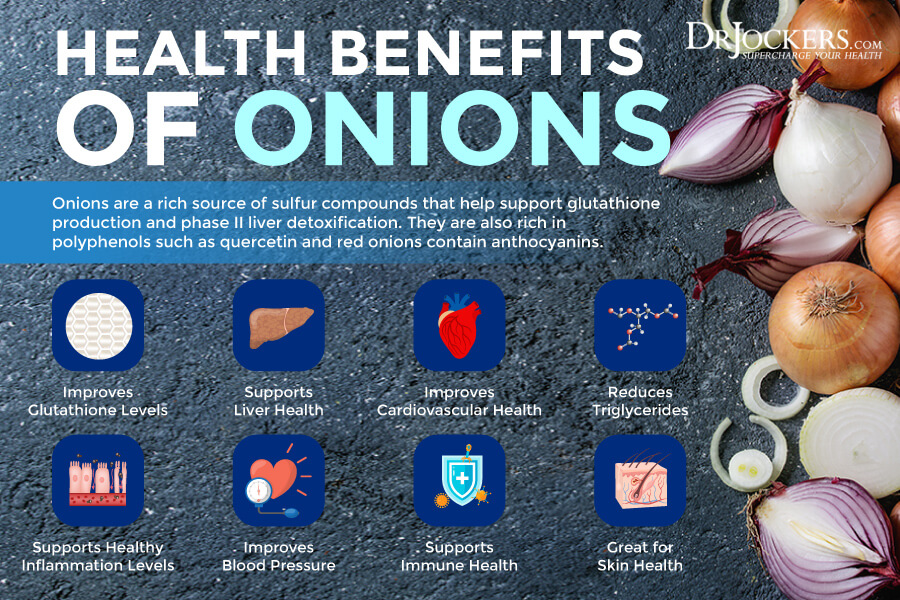
Rich in Antioxidant PhytoNutrients
Red onions are also a rich source of the flavonoid antioxidant quercetin and the polyphenol antioxidant anthocyanin. These antioxidants prevent the oxidation of dietary and cellular fatty acids. They are very powerful free radical scavengers that neutralize cancer cell growth and dramatically reduce whole body inflammation (5, 6).
Many believe that consuming quercetin from onions is more effective than taking quercetin extracts in supplement form. The body is able to better recognize the nutrient when it is in a natural form and has other synergistic components associated with it.
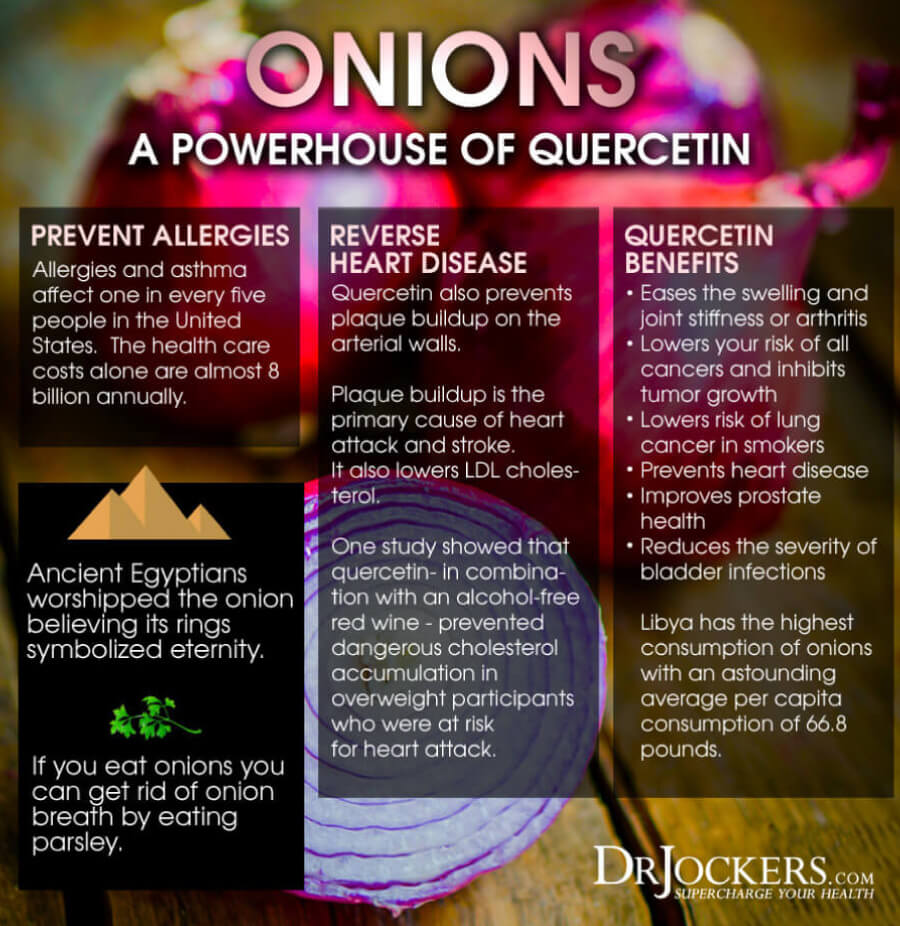
Red Onions are Rich in Chromium:
Red onions are also a fantastic source of chromium which lowers blood sugar and enhances cellular insulin sensitivity. Nearly 50% of the US population is deficient in chromium which is greater than any other developed nation (7). This is due to over cropping that has stripped the land of chromium and processed food consumption. Chromium deficiencies lead to diabetes and heart disease.
The antioxidant flavonoids are extremely rich in the outer layers of the onion. Many people will peel off the first few layers and lose much of these critical nutrients. Be sure to utilize the outer, fleshy edible portions as much as possible. Over peeling, by taking off the outer 2 layers of flesh will cost one about 20% of its quercetin and over 75% of its anthocyanins.
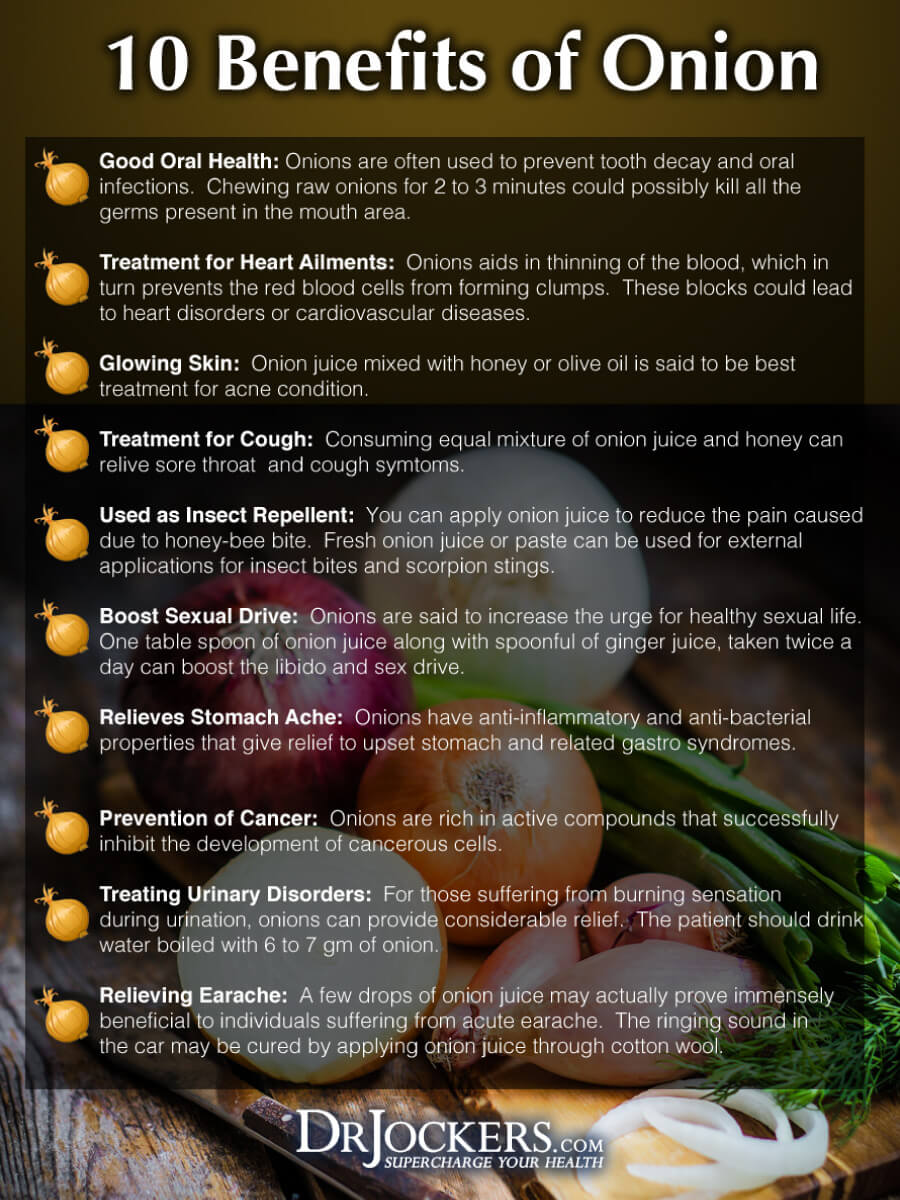
How Many Red Onions to Eat?
Simmering onions in a soup or broth will damage some of the anthocyanins but not the quercetin. The quercetin moves into the soup or broth. The lower the heat the more nutrients will be contained in the soup or broth. Studies have shown that 4-7 servings of red onions each week (equivalent to about 2-3 onions) has been associated with the greatest benefit in reducing colorectal, oral, laryngeal, esophageal & ovarian cancer (8).
Red onions should be stored in a cool, dry area with good airflow. Until they are opened they should not be stored in a refrigerator or plastic bag as both of these have been shown to speed up spoilage. Once opened, it is best to store in refrigeration. Avoid any onions that are wet, soft, bruised or have dark spots or mold on them.

Frequently Asked Questions With Onions:
1. Do I Need to Purchase Organic Onions?
Because onions are covered in a thin skin and are very sharp and pungent they repel pests. They are not highly sprayed with toxic herbicides and pesticides and therefore can be purchased non-organic without significant risk for toxic chemical exposure.
2. How Do I Reduce the Effect Onions Have on My Breath?
You can reduce the negative effects onions and other sulfur rich foods (garlic, shallots, radishes) have on your breath by consuming green veggies, bitter herbs such as dandelion, parsley or cilantro and herbs such as rosemary, fennel and peppermint.
I often advise my clients to consume parsley or make a green drink on days when you are consuming a lot of raw onion.
3. Do I Get the Same Benefits from Cooked Onions as I Do with Raw Onions?
No, you will certainly lose much of the nutrient content but you will still get some of the benefits so it is better to consume cooked onions than no onions at all.
4. What if Onions Give Me Gas When I Eat Them?
Onions have very healthy polyphenols (quercetin) that help to improve the make up of our gut microflora. For most individuals, they are extremely good for the gut microbiome. However, they also contain fructan sugars that are part of the FODMAP group. Some individuals with small intestinal bacterial overgrowth (SIBO) and other digestive issues can struggle to digest these sugars. This can lead to gas and bloating.
If you notice gas, bloating, cramping when consuming onions than take them out of your diet and follow a low FODMAP diet for a period of time while you work to heal your gut.
5. Do Vidalia Onions and White Onions Have the Same Benefits as Red Onions?
The vidalia and white onions are very healthy as they do contain the sulfur compounds, quercetin and chromium. However, red onions are the only onions that have anthocyanins and therefore they are more nutrient dense than any other form of onion.

